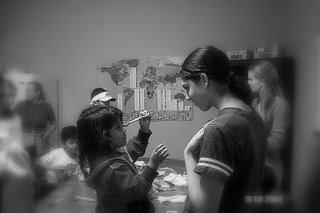
“Altamirano: Your Holiness, a surgeon to save the body must often hack off a limb. But in truth nothing could prepare me for the beauty and the power of the limb that I had come here to sever.”
-from The Mission
Reductions were colonies settled by the Catholic order of the Jesuits in the Tupi-Guarani areas of Portuguese Brazil and Spanish America in order to "civilise" and cathequise the native populations of South America. They came to be considered as virtually independent states; this, combined with their resistance to enslavement and the absolute dominion of Crown representatives led to their ultimate repression and the expulsion of Jesuits from the Portuguese Empire….
….The missions ended in 1767, with the expulsion of the Jesuits by the Spanish and Portuguese empires. The Guarani returned to the forest. All that remains today from that period are ruins of some of the Reductions, and the indigenous language, the Guaraní, which is the only native language to be the official language of a South American nation: Paraguay.
-from “Reductions,” Wikipedia Online
In tenth grade I wrote a twelve-page paper for my European Literature that described the bloody history of Ireland—a history between the oppressors and the oppressed. I condensed the entire history of Ireland into twelve paltry pages.
The paper was pretty awful. I don’t really know anything about Ireland.
But even though my paper didn’t do justice in underscoring the complexity of the ongoing struggle among Catholics and Protestants in Ireland, I do believe that even my unripe fifteen-year-old mind grasped the ugliness and pain concomitant with conquest.
It’s ugly.
I’m not going to delve into a multi-page rampage against the ugliness of colonization. I really don’t know much about colonization…I’d like to take more history classes to get the facts straight. I’d like to read more books like Things Fall Apart; I’d like to watch more movies like The Mission.
Colonization and conquest and imperialism are subjects that really aren’t taught much in high school; and if taught at all, they are taught from a euro-centric standpoint. Why must we study history in a straight line, as if everything occurred in a neat, tidy string of causes-and-effects? Why must we read the Great European Novels and analyze the Best American Literature? Why was the only non-western book required in my high school curriculum “Cry, the Beloved Country?”
There’s so much more to the world than is conveyed in the last four-hundred years of Western history.
English is my only language. Apart from Spanish and perhaps a bit of Mandarin or Korean, it’s the only language I hear about 98% of the time.
Nearly 1/6 of the world’s languages are contained on the small land mass known as Papua New Guinea. More than 700 indigenous languages are spoken in that country, whose motto is “Unity in Diversity.”
(Who said that America was the Mosaic?!)
At any rate, this is just food for thought. I haven’t yet refined my thoughts. I don’t think it’s really possible…conquest and imperialism and war and hatred really aren’t subjects that can be summed up profoundly on a college student’s blog. I wish I had the right answers….heck, I wish I had the right questions so other people could come up with the right answers. I’m just disturbed, that’s all. And I don’t really know what to do with that feeling. I know that tonight I will study for my Greek History final exam, turn out the lights on my 20-dollar lamp from Target, and sleep in a happy dreamland of sugarplums and fairies. I don’t like that dream-land, but I’m not really doing anything to “fix” the problems of the past, now, which still exist today…even though clothed in different garb.
How, then, shall we live?


No comments:
Post a Comment